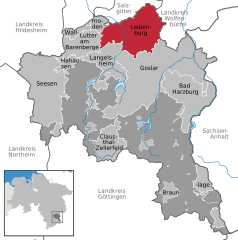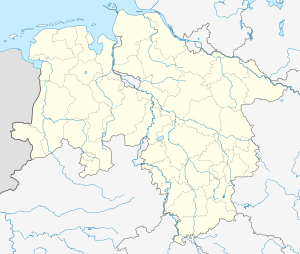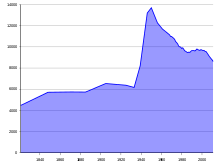Liebenburg
Liebenburg is a municipality in the district of Goslar, in Lower Saxony, Germany.
Liebenburg | |
|---|---|
 Coat of arms | |
Location of Liebenburg within Goslar district   | |
 Liebenburg  Liebenburg | |
| Coordinates: 52°01′27″N 10°26′02″E | |
| Country | Germany |
| State | Lower Saxony |
| District | Goslar |
| Subdivisions | 10 districts |
| Government | |
| • Mayor | Alf Hesse (SPD) |
| Area | |
| • Total | 78.73 km2 (30.40 sq mi) |
| Elevation | 128 m (420 ft) |
| Population (2018-12-31)[1] | |
| • Total | 7,879 |
| • Density | 100/km2 (260/sq mi) |
| Time zone | CET/CEST (UTC+1/+2) |
| Postal codes | 38704 |
| Dialling codes | 05346 |
| Vehicle registration | GS |
| Website | www.liebenburg.eu |
Geography
The municipal area is situated north of the Harz mountain range, within the eastern Salzgitter Hills of the Innerste Uplands. It borders on the district capital Goslar, approx. 12 km (7.5 mi) in the south; the adjacent municipalities in the north are Salzgitter-Bad and Schladen in Wolfenbüttel District.
Subdivisions
The municipality comprises Liebenburg proper (with 2,140 inhabitants[2]) and the following nine villages, which were incorporated on 1 July 1972 with the following population as of 30 June 2018:[3]
- Dörnten (1,189 inhabitants) with Kunigunde
- Groß Döhren (872)
- Heißum (301)
- Klein Döhren (420)
- Klein Mahner (333)
- Neuenkirchen (206)
- Ostharingen (246)
- Othfresen (1,902) with Heimerode and Posthof
- Upen (317)
History
Archaeological excavations of a gallery grave indicate a settlement of the area in the Late Neolithic. The former Saxon estates in 1235 belonged to the territory of the newly established Prince-Bishopric of Hildesheim.
From 1292 to 1302, Prince-bishop Siegfried II of Querfurt had the Levenborch spur castle erected in the Salzgitter Hills, near where his episcopal lands bordered on the Principality of Brunswick-Wolfenbüttel. From 1366 it was pawned by his successors to the citizens of Braunschweig, important to secure the trade route to the Imperial City of Goslar.
The castle was seized by the warlike duke Henry V of Brunswick-Wolfenbüttel after the Hildesheim Diocesan Feud in 1523 and temporarily served as hidden residence of his mistress Eva von Trott. The Catholic duke in turn lost it to the Protestant Schmalkaldic League, whose troops campaigned the Brunswick lands from 1542 until their final defeat in the 1547 Battle of Mühlberg. During the Thirty Years' War, the stronghold was used as headquarters by the Imperial Generalissimo Albrecht von Wallenstein in 1625, it was occupied by Swedish troops in 1633, and reconquered by the Imperial Army in 1641.
By a 1643 peace treaty with the Braunschweig dukes, the heavily damaged castle was restored to Hildesheim, while day laborers and craftsmen lived within its walls. The Hildesheim prince-bishops promoted the settlement of Catholic families. The castle itself was partly rebuilt in a Baroque style by the order of the Wittelsbach prince-bishop Clemens August until construction work was abandoned due to the outbreak of the Seven Years' War in 1756. After the bishopric was finally secularised in 1802, Liebenburg fell to the Kingdom of Hanover in 1814.
Demographics

|
|
|
|
(from 1968 on numbers of inhabitants as of 31 December)[4]
Politics
Seats in the municipal assembly (Gemeinderat) as of 2011 local elections:
- SPD: 11 seats
- CDU: 8
- Greens: 1
- Die Linke: 1
- Free Voters: 1
Elections in September 2016:
- SPD: 10 seats
- CDU: 7 seats
- AfD: 2 seats
- Alliance 90/The Greens: 1 seat
- FDP: 1 seat
- The LEFT: 1 seat
Mayors
- Since October 2013: Alf Hesse (SPD)
- 1996-2013: Hubert Spaniol (SPD)
References
- Landesamt für Statistik Niedersachsen, LSN-Online Regionaldatenbank, Tabelle 12411: Fortschreibung des Bevölkerungsstandes, Stand 31. Dezember 2018.
- Population statistics, municipality of Liebenburg - 01.05.2014
- "Einwohner der Gemeinden und Ortsteile" (PDF). Landkreis - Goslar.
- Niedersächsisches Landesamt für Statistik. "Bevölkerungsfortschreibung" (in German).